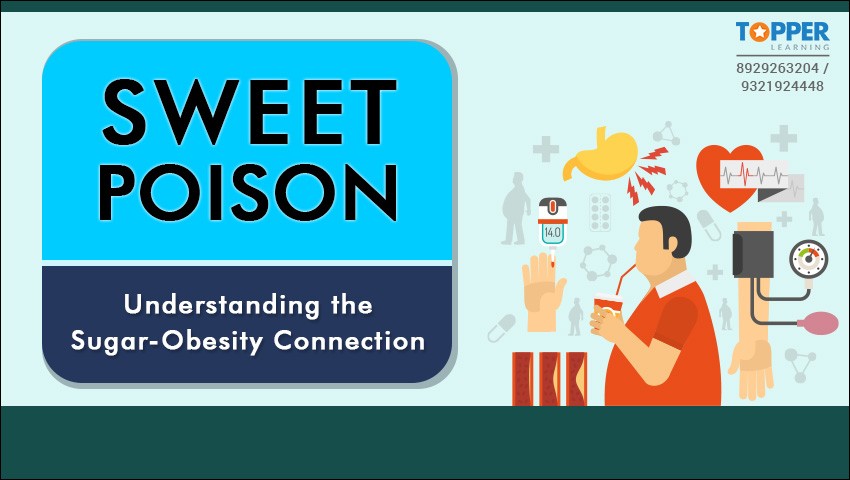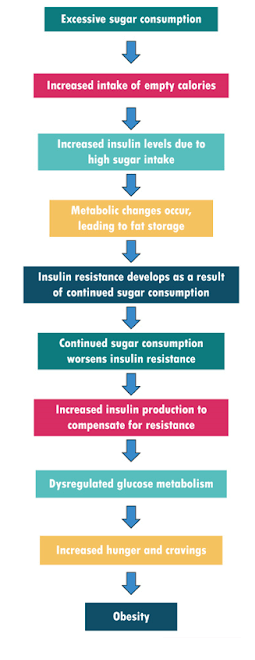Sweet Poison: Understanding the Sugar-Obesity Connection

Are all sugars bad? What are some healthier alternatives? Discover the connection between sugar intake and obesity and learn how to embark on a sugar-conscious lifestyle.
By Sheetal Kolte 24th Apr, 2024 | 12:30 pm
ShareIn the land of cravings and calories, let not the irresistible gulab jamuns set the tune for insulin resistance!
Those flavoursome candy bars and added spoonfuls of sugar to afternoon tea often hold secrets that could add extra inches to your waistline. Yes, behind the delightful taste lies a hidden danger that has quickly seeped into our lives, becoming a staple ingredient in a myriad of beverages and processed fast foods.
Often concealed under different names on ingredient labels, sugar forms are one of the leading causes of obesity. So, in this article let’s set out to investigate the connection between sugar, soaring obesity rates, and some of the worrying diseases of the twenty-first century. Read on for some startling health and wellness facts!
Why Do You Need to Limit Your Intake of Sugar?
Let’s face it: sugar can harm your skin, hair, mind, and body. We don’t say this; research speaks out loud!
- A 2023 JAMA Dermatology study suggests that consumption of fatty and sugary foods is linked to a 54% increased risk of acne, and sugary drinks increase this risk by another 18%.
- A study conducted by researchers from Tsinghua University found that hair loss problems were highly prevalent in about 30% of men who consumed at least one sugary drink per day.
- Recurring exposure to elevated glucose levels diminishes mental capacity. In fact, they have been associated with a greater degree of brain shrinkage. (Well, don’t expect a sudden decrease in size. Shrinkage is about high blood sugar damaging the brain's blood vessels, which can cause brain cells to die, hence shrinking the precious organ!)
- Research published in Nutritional Epidemiology suggests that sugar intake (especially in beverages) of above 25 g/day results in a higher risk of overweight/obesity.
The Pathway of Sugar to Obesity Explained
To make it easier for you to understand the cause and head towards a healthy lifestyle, we’ll break things down in simple terms.
When you eat a lot of sugar, your blood sugar goes up, making your body work extra hard to balance it. And once it manages to bring down the levels, the body starts to crave more sugar after it has witnessed that joy of energy spike; eventually, you satiate the urge.
Too much sugar can confuse your body’s insulin and can lead to problems like insulin resistance.
Hasn’t the word insulin resistance appeared too frequently lately? Here’s what it means:
Insulin resistance is like a lock-and-key problem in your body. Your body cells have doors, and insulin is the key. It unlocks these doors to let glucose (sugar) inside body cells for energy.
In insulin resistance, though your body is producing insulin, the key isn't unlocking the door effectively. Consequently, glucose is unable to get into the cells and supply energy. This condition leads to higher levels of glucose (sugar) in the blood.
This increased sugar circulating in the blood alters every mechanism, including hormones. You gain weight, age faster, develop wrinkles, and the list continues. Added Sugars are Bad for Health
Added Sugars are Bad for Health
It is noteworthy that not every form of sugar contributes equally to the vicious cycle of sugar intake and obesity. Added sugars are our biggest foes.
What are added sugars?
These are sugars and syrups that are added to beverages and food items when they are processed or prepared, often to increase their shelf life and taste.
In fact, the pure crystallised sugar extracted from sugar cane plants is one of the most acid-forming substances, be it white, tan, or brown.
A diet high in added sugars can be a contributor to obesity, diabetes, dementia, heart and liver diseases, and even cancer.
Foods and beverages that are high in added sugars are typically calorie-dense. However, they are nutrient-poor. They fail to bless you with the same level of satiety as their counterparts: whole foods rich in essential nutrients, roughage, and fibre. As a result, people tend to consume more calories, leading to overeating and weight gain.
This overconsumption of calories, fueled by foods high in added sugars, has contributed significantly to the global obesity epidemic, as highlighted by the WHO, which notes that obesity rates have more than doubled worldwide since 1990.
Watch Out for These Added Sugars On Your Next Shopping Spree
Make it a habit to look beyond the amazing front side of packages.

Read food labels and look for the following names for added sugars:
- Malt sugar
- Corn sweetener
- Fruit juice concentrates
- Corn syrup
- Invert sugar
- Molasses
- Brown sugar
- Syrup sugar molecules ending in "ose" (maltose, dextrose, glucose, fructose, lactose, sucrose).
Good News for Those With Sweet Tooth: Naturally Occurring Sugar Isn’t A Problem
If you are not a diabetic, you can satisfy your cravings with natural sugars.
Found in whole, unprocessed foods like vegetables, fruits, dairy, and honey, naturally occurring sugars are far better than added ones.
Look out for natural sweeteners like:
- Honey
- Maple syrup
- Coconut, palm, or date sugar
While these alternatives still contain sugar, they bring along additional nutrients and flavours compared to crystallised sugar.
How to Cut Down on Sugar Intake?
Some tried and working tips for a sugar-conscious lifestyle that help cut down sugar intake and manage obesity are:
- Reading food labels
- Cooking and baking at home
- Limiting sugar intake in beverages or any other liquid form
- Choosing whole foods/fruits with fibres
- Picking natural sweeteners
- Allowing occasional treats but in moderation
Conclusion
It’s important to recognise that limiting sugar consumption and heading towards health and wellness is a journey of mindful choices. Little steps can be your partner in reducing dependence on added sugars and fighting obesity.
The next time you grab your favourite guilty pleasure snack, get your mind’s magnifying glass, too!
Make conscious choices and consider encouraging the masses with a unified effort. Learn about several health and wellness topics, along with other important subjects, with TopperLearning- your go-to online learning site. We bring you carefully curated, comprehensive study materials for your needs.
TopperLearning is now on WhatsApp Channels!
Subscribe today by clicking the link, and stay updated!
FAQs
Q 1. How much is excessive sugar consumption that can affect my health?
Ans: The American Heart Association suggests that men should have no more than 150 calories (about 9 teaspoons) of added sugar per day. For women, it is 100 calories (about 6 teaspoons).
Q 2. What are some common sources of hidden sugars in our diet?
Ans: Some common sources of hidden sugars are:
- Store-bought Salad Dressings
- Soda and Soft Drinks
- Pasta Sauces
- Packed Yoghourts
- Granola and Energy Bars
- Condiments
- Packaged Fruit Juices
- Flavoured Coffee and Tea Drink
- Sports and Energy Drinks
Q 3. Can I completely eliminate sugar from my diet?
Ans: No, certain amounts of sugar can be found in almost every second thing that you eat, be it fruits, vegetables, dairy products, or nuts. While you cannot eliminate naturally occurring sugar, you can definitely do away with added ones.
Q 4. What are some practical tips for transitioning to a sugar-conscious lifestyle?
Ans: Some of the best tips for sugar-conscious lifestyle are:
- Start your day with savouries/salty food
- Every meal must follow the order: salads-proteins-carbohydrates
- Pick whole fruits over fruit juices
- A tablespoon of apple cider vinegar diluted in a glass of water 20 minutes prior to meals checks the sugar spike.
Q 5. Are artificial sweeteners a better alternative to sugar?
Ans: Yes, artificial sweeteners, such as stevia, aspartame, and others, offer sweet flavour without adding some extra calories when used in moderation.
More from Education
Important Resources
- Education Franchisee opportunity
- NCERT Solution
- CBSE Class 9 Mathematics
- NCERT Solutions for class 10 Science
- Sample Papers
- CBSE Class 9 Science
- NCERT Solutions for class 10 Maths
- Revision Notes
- CBSE Class 10 Hindi
- CBSE Class 10 English
- CBSE Class 10 English
- CBSE Class 10 Social Studies
- CBSE Class 10 Science
- CBSE Class 10 Mathematics
- Career In Science After 10
- Career In Commerce After 10
- Career In Humanities/Arts After 10
- NCERT Solutions for Class 10
- NCERT Solutions for Class 11
- Business Studies Class 12 CBSE project





